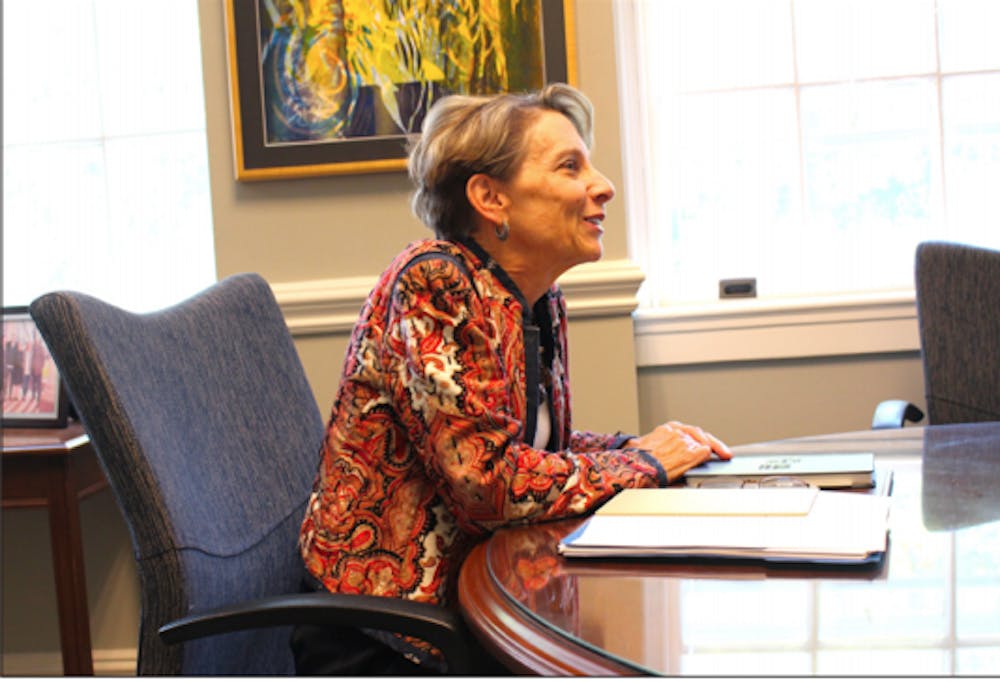By Garrett Cecere
Editor-in-Chief
College President Kathryn Foster has signed a letter to Congress calling for bipartisan legislation in protecting those who are affected by the Deferred Action for Childhood Arrivals.

Her announcement came in an email to the campus on Sept. 9, close to the two-year anniversary of President Donald Trump’s decision to end the program, which allows for undocumented people who immigrated to the U.S. as children to stay in the country.
In her email, Foster wrote that while U.S. Citizenship and Immigration Services is still accepting renewals from those who are enrolled in DACA, the agency is not taking any new applications.
“The deferred action is on deportation,” Foster told The Signal. “This is a profound deferral, and although you can continue to apply for renewal of your deferred action, to the degree that the program has been suspended by the Trump administration, that’s where uncertainty is (high).”
Foster co-signed the letter with presidents from over 600 institutions around the nation. She said the American Council on Education wrote the letter and offered it to leaders from colleges and universities to sign.
According to ACE’s website, over 1,700 institutions comprise its membership. The deadline for leaders to sign the letter was Sept. 13.
The letter stated that a CNN poll in February 2018 showed that more than 80 percent of Americans believe Congress should protect those who are affected by DACA.
“The wisdom in this is to say, ‘we’re not telling you what to do, but get together and take action on this,’” Foster said. “Because the uncertainty is a crisis for teachers and nurses and engineers and students and families.”
According to the Immigrant Legal Resource Center, DACA affects approximately 700,000 people in the U.S.
ACE stated in a Sept. 16 press release that this past June, an updated version of the Dream Act — which would assist young undocumented immigrants in moving toward citizenship — passed through the House of Representatives, but not the Senate.
In her campus-wide email, Foster wrote that the Supreme Court will review lower-court DACA cases at the request of the Department of Justice. The Court’s next term begins in October.
The letter referenced the institutions’ understanding that the Supreme Court will soon review cases. In signing the letter, Foster hopes that leaders in Congress will work together to find a solution for DACA.
“The reason (for the letter’s writing style) is to not take a position, per se, because that alienates people right now, but rather to say, ‘we’re counting on you to work together,’” she said.
This past June, The Washington Post reported that in hearing arguments later this year, the Supreme Court will determine whether the Trump administration had a legal rationale to end DACA.
According to Foster, courts have had mixed findings of the legality of Trump’s decision and the program’s outcome would depend on future legislation. She noted that if the Supreme Court were to find that the administration did not have the right to cancel the program, a clear path to citizenship would still not be in place.
“If the Supreme Court says they did have the right to cancel, then we now have a … DACA legislation that people have been … working under … and it does put into question the ability of people to stay in the United States,” she said.
Foster said that she supports DACA and that the College has stood by the program since former President Barack Obama signed it into law in 2012.
“(I am) a supporter of Dreamers and a supporter of our students and of any student in this country getting that education,” she said. “That is emphatic about where I stand.”
Some students favored Foster’s decision to sign. Dylan Lembo and Giovanna Rubino, both of whom are junior communication studies majors, spoke in support of the program.
“We’re all Americans, we all have a right to make these big moves for institutions, and (Foster) runs an institution with a lot of people from different backgrounds,” Lembo said.
Rubino said she supported DACA, noting the children’s inability to decide for themselves in where they go.
“...Children who are immigrants should have the opportunity for education,” Rubino said. “Everybody deserves an opportunity, especially where they don’t have control over their decisions.”
With the uncertainty of DACA’s future, Foster hopes that Dreamers on campus will know that the College supports them.
“All the services, all of our supports are available to (Dreamers),” she said. “There’s no difference. We don’t know who DACA students are … that’s not something we ask. We don’t challenge people as citizens. That’s not a question that comes up for us.”
In co-signing with the other institutions, Foster stands by the program as the letter goes to Congress and the Supreme Court prepares to hear arguments.
“I will say that the Supreme Court making a decision that we can continue to have DACA would be a really good outcome,” she said.







